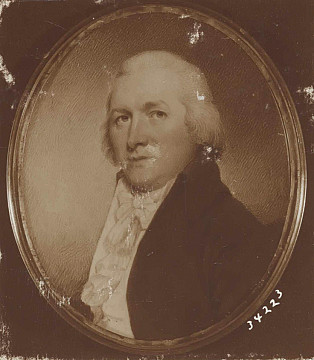Alexander Macomb (1748-1831)
Fur Trader, Shipping Merchant & Landowner, of New York City
He was born in Northern Ireland at Ballynure, Co. Antrim. In 1755, his father (a merchant) took the family to Albany, New York, to engage in the fur trade. Alexander and his brother, William, were active from the Great Lakes to Detroit and in 1774 the influential firm of Phyn, Ellice & Co. sold them their stock in the region and appointed them their agents. Taking in another Northern Irishman (William Edgar) as a partner, Macomb, Edgar & Macomb quickly became, "Detroit's most successful (largest and wealthiest) merchant house". In just four years they billed Governor Haldimand for £200,000, supplying provisions to the (British) garrison, goods to the India department, and acting as Paymaster for post, personnel, militia, volunteers, and interpreters.
By 1785, the firm was dissolved and Macomb retired from the fur trade with an ample fortune to invest in New York. There, he went into shipping and invested in land, buying and selling large tracts in Georgia, Kentucky, and North Carolina. In 1788, he built one of the largest houses in the city (see images), a four-story townhouse with a 112-foot facade on the west side of Broadway facing Bowling Green, between - a block south of - Trinity Church and the Battery. He employed 25-servants, 12 of whom were African-American slaves making him the third-largest slaveholder in the city. In early 1790, the house was leased by the U.S. government for George Washington after the President found the Osgood House (the first U.S. Presidential mansion) too small for administrative purposes.
In 1791, Macomb bought 4,456,960-acres (6,620-square miles) north of New York's Oneida County (including the present counties of Lewis, Jefferson, St. Lawrence and Franklin along with parts of Oswego and Herkimer) that became known as "Macomb's Purchase," the greatest land transaction in the history of the State of New York. However, the Panic of 1792 triggered by the Napoleonic Wars resulted in land sales falling behind his due dates for repayments. Defaulting on over $300,000, Macomb was taken to debtors' prison. He died poor in 1831 having been supported by his son, Gen. Alexander Macomb. He was married twice and had eighteen children of whom twelve (listed) lived to adulthood.
By 1785, the firm was dissolved and Macomb retired from the fur trade with an ample fortune to invest in New York. There, he went into shipping and invested in land, buying and selling large tracts in Georgia, Kentucky, and North Carolina. In 1788, he built one of the largest houses in the city (see images), a four-story townhouse with a 112-foot facade on the west side of Broadway facing Bowling Green, between - a block south of - Trinity Church and the Battery. He employed 25-servants, 12 of whom were African-American slaves making him the third-largest slaveholder in the city. In early 1790, the house was leased by the U.S. government for George Washington after the President found the Osgood House (the first U.S. Presidential mansion) too small for administrative purposes.
In 1791, Macomb bought 4,456,960-acres (6,620-square miles) north of New York's Oneida County (including the present counties of Lewis, Jefferson, St. Lawrence and Franklin along with parts of Oswego and Herkimer) that became known as "Macomb's Purchase," the greatest land transaction in the history of the State of New York. However, the Panic of 1792 triggered by the Napoleonic Wars resulted in land sales falling behind his due dates for repayments. Defaulting on over $300,000, Macomb was taken to debtors' prison. He died poor in 1831 having been supported by his son, Gen. Alexander Macomb. He was married twice and had eighteen children of whom twelve (listed) lived to adulthood.









